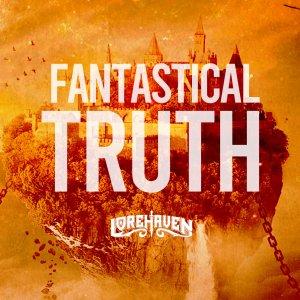Fantastical Truth

227. Is Christianity Preventing a ‘Star Trek’ Future? | with Dr. Sarah Salviander
Space. The next-to-final frontier. So what’s the final one? It’s the future. As sci-fi fans, Stephen and Zack enjoy debating space travel possibilities, Moon stations and Mars colonies (likelier now after the liquid water finding?), and of course those armies of the aliens. Now we’ll ask whether today’s scientists and speculators recognize Christianity’s crucial role in their disciplines, and whether they see a place for Christianity in their vision of the future.
Episode sponsors Enclave Publishing: Winter’s Maiden by Morgan L. Busse The Katrosi Revolution series by Jamie Foley Join the Above the Circle of Earth cover reveal crew Mission update- Lorehaven reviews: Winter’s Maiden and After Moses
- Subscribe free to get updates and join the Lorehaven Guild
- We reference this meme about what is supposedly holding back the Star Trek future.
- “Top 10 believing scientists, part 1,” July 18, 2024, and “Top 10 believing scientists, part 2,” Sarah Salviander, Aug. 1, 2024: Part 1 and Part 2
- “How the worst characters in sci-fi help me deal with the problem of evil,” Sarah Salviander, Feb. 6, 2024
“The chief aim of all investigations of the external world should be to discover the rational order and harmony which has been imposed on it by God and which He revealed to us in the language of mathematics.”
—Johannes Kepler
“To know the mighty works of God, to comprehend His wisdom and majesty and power; to appreciate, in degree, the wonderful workings of His laws, surely all this must be a pleasing and acceptable mode of worship to the Most High, to whom ignorance cannot be more grateful than knowledge.”
—Nicolaus Copernicus
Dr. Sarah Salviander is a Bible-believing, power-lifting, cancer-surviving, PhD astrophysicist. She was raised atheist in a secular country: no churches or temples, no scriptures or holy books, no discussions about God or gods. Her north star was science, which led her into a PhD astrophysics program. But pondering the mystery of existence caused her naturalistic beliefs to crumble. And studying the evidence for Christianity convinced her it was true. She’s now a research scientist, professor, and writer, and lives with her family in Texas.
1. How Christians influenced modern science- Christians expected an orderly universe
- Christians expected an expanding universe
- How the study of the stars led to faith in the creator of the cosmos
- Star Trek imagines a utopia brought about by warp drive
- Star Trek doesn’t think religion has much of a place in the future
- But somehow most Star Trek characters agree on basic morality
- What we should expect about scientific and astronomical discoveries in the next decade or so
- Does God forbid or otherwise prevent space travel? (Genesis 11, Isaiah 45:18, Matthew 24:31)
- How naturalism and neo-pagan religions are becoming increasingly common within the scientific community
- How Christianity will continue advancing science
- What favorite star, exoplanet, or other part of the galaxy do you hope to visit someday?
Just finished the new episode y’all did about Lord of the Rings. I was 100% someone introduced to Middle-earth via the first Peter Jackson movie. I had a vague awareness of The Hobbit but no knowledge of LOtR. I remember leaving the theater from Fellowship, going directly downstairs from the theater in the mall into Barnes and Noble to buy the three-in-one trilogy book which I still own until this day. I had the trilogy read by the end of Christmas break and have read or listened to it all multiple times since then. I took Tolkien classes as an undergrad and graduate student and routinely reference Middle-earth in my classes as a teacher at a classical school. In fact, I have made it clear that if a book I teach is removed, I will campaign hard for The Hobbit to be its replacement.
Thank you, Peter Jackson.






 Visit Podcast Website
Visit Podcast Website RSS Podcast Feed
RSS Podcast Feed Subscribe
Subscribe
 Add to MyCast
Add to MyCast